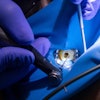
A 65-year-old man attended a blood pressure (BP) clinic at a U.K. dental center and was later hospitalized for potentially lifesaving treatment for heart failure. The case report was published in the British Dental Journal.
Health checks, including vital sign screenings, conducted in primary care dental settings help alert patients and healthcare providers to potential health issues and prevent more serious complications as well as higher costs.
“Integrated dental-GP care pathways and referral networks could potentially reduce the risk of major cardiovascular events and associated mortality,” wrote the authors, led by Amazon Doble, a PhD student at the University of Plymouth Peninsula Dental School (Br Dent J, December 8, 2023, Vol. 235, pp. 866-868).
The ADA advises dentists to routinely measure blood pressure during dental appointments. Currently, the ADA recommends that dentists take blood pressure readings at dental visits. Several published resources have recommended that dentists postpone treatment for patients with blood pressure levels as low as 160/100 mmHg for elective oral healthcare and 180/110 mmHg for urgent dental treatment. However, dentists rarely adhere to these guidelines.
A 65-year-old man with hypertension
In this case, a 65-year-old man with a previous history of hypertension who was taking antihypertensive medication attended the university’s dental school BP clinic as part of an initial hypertension study in 2022. His systolic and diastolic blood pressure were 150 and 85 mmHg, respectively, according to the study.
After his readings were taken after a 10-minute rest period on a bed in a quiet setting using the Microlife WatchBP Office monitor, he was referred to secondary care. On June 23, 2022, -- six days later -- the man was hospitalized for heart failure (HF) and suspected acute coronary syndrome (ACS), Doble et al wrote.
After being discharged in July 2022, the participant was prescribed 40 mg of furosemide and 75 mg of aspirin and sent to a cardiologist 10 days later. Initially, the cardiologist attributed the high blood pressure to dental anxiety. However, it was confirmed that the patient’s blood pressure remained high despite taking the medication.
Therefore, the man's medication plan was changed. He was prescribed amitriptyline, atorvastatin, celecoxib, codeine, pregabalin, and sertraline. He was advised to continue taking Candesartan, they wrote.
The importance of conducting HB readings
Taking patients’ blood pressure at the dentist can help identify individuals who are at high risk of cardiovascular issues, the researchers noted. The findings indicate more work with general practitioners is needed to emphasize the role dental clinicians play in potentially reducing the risk of major cardiovascular events, Doble et al wrote.
“Given that hypertension presents as a large risk factor for HF and ACS, and that this patient was treated for these conditions after the initial referral from the dental setting, this case highlights the importance of case finding individuals with inadequate BP control,” they wrote.




















